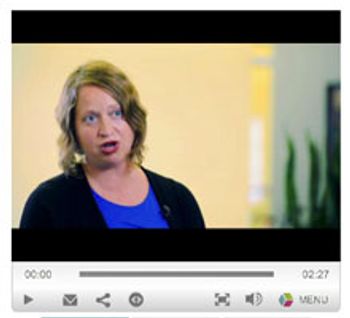
The latest news on the growing cost of conducting clinical trials is becoming a major concern for company sponsors and trial co-operative groups.

The latest news on the growing cost of conducting clinical trials is becoming a major concern for company sponsors and trial co-operative groups.

In less than a decade, online video marketing has moved from a standing start to become an essential part of the digital marketing mix

This week (February 28), Europe will celebrate Rare Disease Day. This is an interesting example – one might almost say a rare example – of a successful attempt by a European interest group to capture public attention.

Any pricing or revenue management initiative is only as good as the information on which it is based.

Europe’s main pharma industry bodies - EFPIA, EGA, EuropaBio, AESGP and EUCOPE - have issued a joint statement to express concern about “the increasing financial burden of regulatory costs incurred since the adoption of the pharmacovigilance package in 2010?.

In this short video, Brianna Cayo-Cotter, Change.org’s managing director of communications, talks to Pharm Exec about how advocacy organizations and individual patients are getting more involved in every facet of the healthcare system, from drug R&D, to federal and state policy, all fueled by the hour-to-hour passion of living with a disease.

Four class representatives have been added to a class-action gender-discrimination employment suit originally filed last May against Merck & Co. in New Jersey.

Cuts in healthcare costs due to post-recession austerity programs mean favorable Health Technology Assessments (HTAs) are becoming crucial to the successful market launch of pharmaceuticals in Europe.

America’s biopharmaceutical research companies are currently developing 180 new medicines to help the nearly 400 million people who have diabetes worldwide.

To mark its 25th year in recognizing female leadership in the tough competitive ranks of biopharma, the Healthcare Businesswomen’s Association (HBA) is opting for a breakout triple play.

Despite notable successes in preventing and mitigating short supplies of important medicines, the drug shortage crisis still disrupts medical treatment and gives drug manufacturers a bad name.

As the United Kingdom debate about whether to stay in the European Union becomes more bitter and intense, an insight into how EU membership impacts on medicines and pharmaceuticals has appeared from a British politician who was until recently the UK Government Adviser on Life Sciences, George Freeman.

Accenture has launched the latest version of its annual study of the biopharmaceutical industry.

Thirty-five out of every 100 job applicants in the pharmaceutical or clinical trial space in India “are lying about their credentials”, says a report by Delhi-based employee screening firm AuthBridge.

New products in development for women distressed by a lack of sexual desire and satisfying sexual experiences are causing a stir, but not for the reasons one might expect.

The European Medicines Agency (EMA), in agreement with the European Commission, has released an updated question and answer document clarifying a number of issues related to the new categories of variations to the terms of marketing authorizations that were introduced by the agency in August 2013.

The European type 2 diabetes market earned revenues of €9.50 billion in 2009 and is estimated to reach €15.46 billion in 2017 (CAGR 3.8 percent), according to new research by Frost & Sullivan.

Approximately $12.7 billion has been invested in Latin America’s (LATAM’s) pharmaceutical market through mergers and acquisitions (M&As) in recent years.

The Patient-Centered Outcomes Research Institute (PCORI) is launching new programs that are expected to encourage more analysis of the effectiveness of specific drugs and medical products

Pharma industry executives, FDA officials and Department of Justice attorneys speaking last week at CBI’s 11th annual Pharmaceutical Compliance Congress (PCC) offered solutions and threats to companies hoping to avoid enforcement actions.

Marketers may see further advice from the Food and Drug Administration in the coming year that clarifies how they can use social media.

The UK National Institute for Health and Care Excellence’s (NICE) decision that relapsed non-small cell lung cancer patients should no longer have access to Roche’s cancer pill Tarceva (erlotinib) is a setback for lung cancer care in England and Wales.

The European Medicines Agency (EMA) is 20 years old this year - and it confronts many of the problems familiar to anyone at that age.

For the first time, the spotlight shines on Russia's potential in biotechnology and pharma products

It is nowadays fashionable to question everyone in authority, and there is no shortage of self-appointed watchdogs who aim to make sure that things that happen are happening as they should.

It is tempting to imagine the use of the patient’s own mobile computing platform for collection of patient reported outcomes.

New research from Frost & Sullivan reveals that the global biosimilars market earned revenue of about $1.2 billion in 2013 and could reach $24 billion in 2019.

The gastrointestinal (GI) therapeutics market for Irritable Bowel Syndrome (IBS), Ulcerative Colitis (UC) and Crohn’s Disease (CD) in the Asia-Pacific (APAC) region will increase in value from $564m in 2012 to $784m by 2019 (a CAGR of 4.8%).

Moving fast to bolster its authority over compounding pharmacies that operate as manufacturers of prescription drugs, FDA is urging “outsourcers” to register, seeking state support, and moving to issue more rules and guidance.

The initial proposals for Value Based Pricing (VBP) in the UK have evolved into something very different. There is now a focus on Value Based Assessment (VBA).